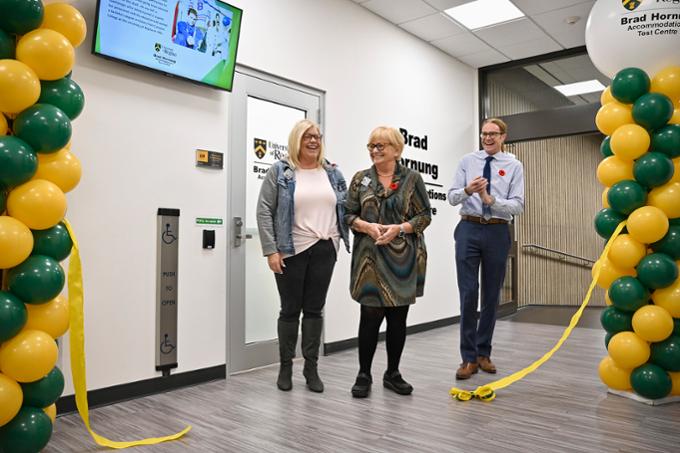The legacy of alumnus Brad Hornung lives on at the University of Regina through the new Accommodations Test Centre, which has been renamed in his honour.
Hornung’s family made the announcement at a special event attended by members of the University and wider community on Friday morning.
“Following Brad’s death, we had to decide what to do with the funds remaining in the Brad Hornung Foundation,” Leanne Wright, Brad Hornung’s sister, said.
“Considering this money was provided to Brad by the wonderful people of Regina and Saskatchewan – and considering both Brad’s educational journey and love of athletics – we thought a perfect fit would be to establish some things that would continue Brad’s legacy at the University of Regina.”
The Hornung family and what is now known as the Brad Hornung Legacy Fund at the University of Regina are also supporting the acquisition of accessible fitness equipment and creation of two endowed Cougars’ hockey scholarships of approximately $1,500. Every fall, one player from each the Cougars’ women’s hockey team and Cougars’ men’s hockey team will be awarded them.
Hornung died from cancer earlier this year. He was 52 years old.
A talented forward with plans to go pro, he was playing for his hometown WHL Regina Pats when his life changed course. In 1987, during a game against the Moose Jaw Warriors he suffered a severe spinal cord injury that left him a quadriplegic.
Ever resilient, Brad went on to enroll at the U of R, where he was one of the first students to require extensive accommodations.
Dr. Stephen King, senior researcher in the U of R Office of the President and emcee of the Friday morning event, was a student alongside Hornung in the early ‘90s and took notes for them both. They became lifelong friends.
“There is no one I know who has overcome greater adversity in life with such courage, grace, and optimism – and no one I know who sets a better example for our students,” King said.
Hornung graduated from Campion College with a bachelor of arts in history in 1996. Additionally, the University awarded him an honorary Doctor of Laws Degree in 2018, recognizing his courage and perseverance.
Hornung was always interested in creating a more accessible campus for those who came after him.
“Brad was clearly passionate about creating a more accessible campus for the students who came after him. The establishment of the Brad Hornung Accommodations Test Centre is not just a testament to those efforts – it’s our commitment to continue them,” University of Regina President and Vice-Chancellor Dr. Jeff Keshen said.
The generous support of the Hornung family and the Brad Hornung Legacy Fund ensures his legacy will live on through the new Brad Hornung Accommodations Test Centre, located in the College West building of the main campus. The Centre offers a safe, secure, and supervised environment for students who require accommodations while writing exams, tests, and quizzes for in-person, for-credit courses.
“The Brad Hornung Accommodations Test Centre is improving our students’ lives,” Jeffery Raymond, director of student wellness, said. “And it will continue to do so for years to come.”
The Accommodations Test Centre aims to provide a consistent testing environment to ensure that all students requiring accommodations are supported in their academic pursuits. There are 58 workstations, 11 private exam rooms and 11 shared exam rooms – all equipped with dual monitors (readers and scribes are available as well).
“We are so proud that Brad’s name will be associated with a centre that provides assistance to so many who are in need,” Leanne Wright said.
The University has committed to creating a healthy campus community and learning environment in its 2020-25 strategic plan All Our Relations, or kahkiyaw kiwȃhkomȃkȃninawak in Cree. Well-being and Belonging is one of the five areas of focus in the plan, with three interconnected objectives within it: Equity, Diversity, and Inclusion; Healthy Living; and Mental Health Literacy and Research.
About the University of Regina
Set in the heart of the Canadian prairies we are a comprehensive, mid-sized university where the opportunities are as limitless as the horizon. Our campuses are on Treaty 4 and 6 - the territories of the nêhiyawak, Anihšināpēk, Dakota, Lakota, and Nakoda peoples, and the homeland of the Michif/Métis nation. It is our responsibility to strengthen relationships with Indigenous communities to build a more inclusive future for all. Our three federated colleges, 10 faculties, 25 academic departments, and 18 research centres foster innovative research with practical and theoretical applications. We are committed to cultivating the potential of our 16,000 students and supporting their health and well-being. We take learning beyond the classroom through work and volunteer experiences to develop career-ready graduates.
Let’s go far, together.
